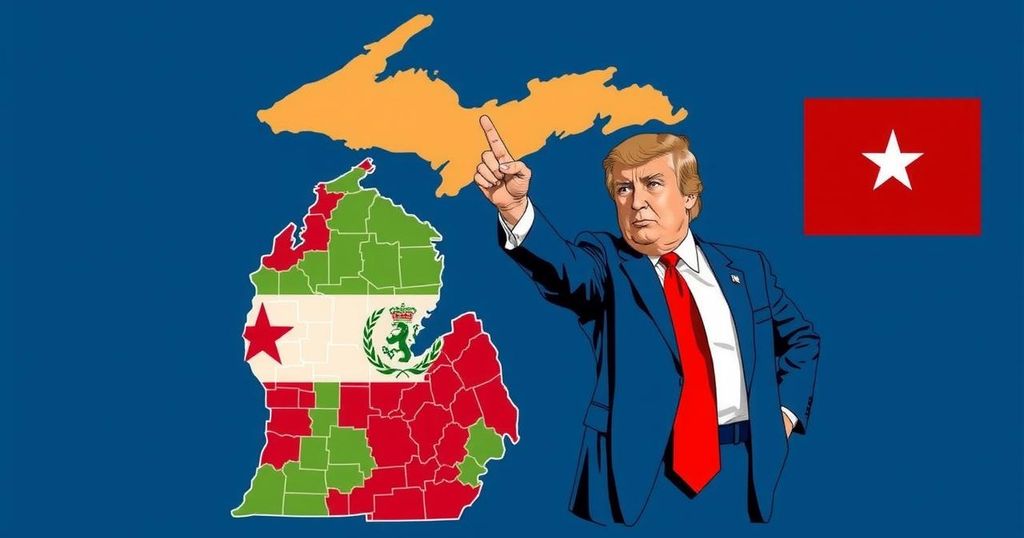The Shift of Arab-American Voters Toward Trump in Michigan
Arab-Americans in Michigan are shifting their political alliances towards Donald Trump as they express dissatisfaction with the Democratic Party, particularly Vice President Harris. This change is influenced by perspectives on U.S. foreign policy, local cultural dynamics, and a feeling of abandonment by the Democrats, suggesting potential significant impacts on future elections.
The evolving political landscape among Arab-Americans in Michigan reveals a significant shift towards Donald Trump despite his previous remarks on immigrants and Muslims. This change is particularly notable in areas like Dearborn and Hamtramck where disillusionment with current Democratic leaders, especially Vice President Kamala Harris, is palpable. The community’s responses are shaped not only by foreign policy, especially toward the ongoing conflicts in Gaza and Lebanon, but also by local cultural issues. High school students from the Frontier International Academy in Hamtramck express distrust in the current administration and indicate a preference for Trump as a perceived safer option. The voting bloc, significant due to Michigan’s status as a swing state, showcases a diverse range of sentiments reflecting economic and social concerns. Mayor Amer Ghalib, a lifelong Democrat, has recently endorsed Trump due to his disappointment with Biden and Harris’s policies while hoping for change under a Trump administration. His endorsement underscores a broader sentiment within the community of feeling overlooked and unheard by the Democratic Party. The visit by Trump to the city has been strategically planned, signaling the importance of Arab-American votes to his campaign. As local activists like Samraa Luqman reflect, voting for Trump has become a stance against perceived injustices, particularly in response to U.S. foreign policy that some believe is contributing to violence against Arab communities. The complexities of this phenomenon illustrate a growing frustration with how the Democratic Party has engaged with these voters, as many feel abandoned and unrepresented in their interests. The conclusion from local leaders resonates: the ramifications of these shifting allegiances extend beyond Michigan; they signify a potential nationwide trend that could affect future elections.
In the context of the 2024 U.S. elections, Arab-Americans in Michigan are showing notable signs of political shift towards Donald Trump, contrasting sharply with their historical alignment with the Democratic Party. Michigan, home to the highest population of Arab-Americans in the nation, plays a crucial role in the electoral map as a swing state. The community’s support for Trump arises from dissatisfaction with current Democratic leadership, particularly regarding foreign policy towards the Middle East and social policies that many within the community find increasingly imposing. This shift reflects deeper cultural and ideological dynamics at play within the community, challenging assumptions about party loyalty and political behavior in response to evolving national and local issues.
The trends observed among Arab-Americans in Michigan signal a significant departure from traditional Democratic support towards Donald Trump, driven by disenchantment with the current administration’s handling of various pressing issues, both domestic and international. The shifting dynamics underscore a broader national concern among minority communities feeling unrepresented and unheard in their needs and values. As concerns about policy direction grow, the implications for future elections may be substantial and warrant careful attention from both major political parties.
Original Source: news.sky.com




Post Comment